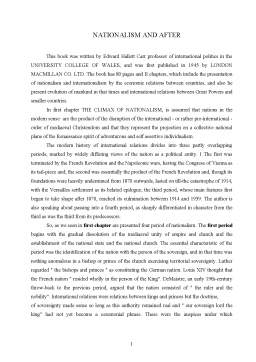Extras din proiect
This book was written by Edward Hallett Carr professor of international politics in the UNIVERSITY COLLEGE OF WALES, and was first published in 1945 by LONDON MACMILLAN CO. LTD. The book has 80 pages and II chapters, which include the presentation of nationalism and internationalism by the economic relations between countries, and also he present evolution of mankind in that times and international relations between Great Powers and smaller countries.
In first chapter THE CLIMAX OF NATIONALISM, is assumed that nations in the modern sense- are the product of the disruption of the international - or rather pre-international - order of mediaeval Christendom and that they represent the projection on a collective national plane of the Renaissance spirit of adventurous and self assertive individualism.
The modern history of international relations divides into three partly overlapping periods, marked by widely differing views of the nation as a political entity. I The first was terminated by the French Revolution and the Napoleonic wars, having the Congress of Vienna as its tail-piece and; the second was essentially the product of the French Revolution and, though its foundations were heavily undermined from 1870 outwards, lasted on till-the catastrophe of 1914, with the Versailles settlement as its belated epilogue; the third period, whose main features first began to take shape after 1870, reached its culmination between 1914 and 1939. The author is also speaking about passing into a fourth period, as sharply differentiated in character from the third as was the third from its predecessors.
So, as we seen in first chapter are presented four period of nationalism. The first period begins with the gradual dissolution of the mediaeval unity of empire and church and the establishment of the national state and the national church. The essential characteristic of the period was the identification of the nation with the person of the sovereign, and in that time was nothing anomalous in a bishop or prince of the church exercising territorial sovereignty. Luther regarded " the bishops and princes " as constituting the German nation. Louis XIV thought that the French nation " resided wholly in the person of the King". DeMaistre, an early 19th-century throw-back to the previous period, argued that the nation consisted of " the ruler and the nobility". International relations were relations between kings and princes but the doctrine,
of sovereignty made sense so long as this authority remained real and " our sovereign lord the king" had not yet become a ceremonial phrase. These were the auspices under which international law was born. It was primarily a set of rules governing the mutual relations of individuals in their capacity as rulers.
The 18th century witnessed many wars; but in respect of the freedom and friendliness of intercourse between the educated classes in the principal European countries, with French as a recognized common language, it was the most" international " period of modern history, and civilians could pass to and fro and transact their business freely with one another while their respective sovereigns were at war.
Equally characteristic were the national economic policies of the period, to which the name" mercantilism" was afterwards given. The aim of mercantilism, both in its domestic and in its external policies, was not to promote the welfare of the community and its members, but to
augment the power of the state, of which the sovereign was the embodiment. Trade was stimulated because it brought wealth to the coffers of the state; and' wealth was the source of power, or more specifically of fitness for war. As Colbert, the most famous and consistent exponent of the system, put it, “trade is the source of finance, and finance is the vital nerve of war”. Internally, mercantilism sought to break down the economic particularism, the local markets and restrictive regulations, which underlay the uniformity of the mediaeval order, to make the state the economic unit and to assert its undivided authority in matters of trade and manufacture throughout its territory. Externally, it sought to promote the wealth and therefore, the power of the state in relation to other states.
Mercantilism was the economic policy of a period which identified the interest of the nation with the interest of its rulers. Its aim, as defined by its most authoritative historian, was "wealth for the nation, but wealth from which the majority of the people must be excluded".
The second period, which issued from the turmoil of the Napoleonic Wars and ended in 1914, is generally accounted the most orderly and enviable of modern international relations.
Its success depended on a remarkable series of compromises which made it in some respects the natural heir, in others the antithesis, of the earlier period. Looked at in one way, it succeeded in delicately balancing the forces of “nationalism” and “internationalism”. We can said that, while in the previous period political and economic power had marched hand in hand to build up the national political unit and to substitute a single national economy for a conglomeration of local economies, in the 19th century a compromise was struck between political and economic power so that each could develop on its own lines.
Preview document
Conținut arhivă zip
- Nationalism and After by Edward Hallett Carr.doc











